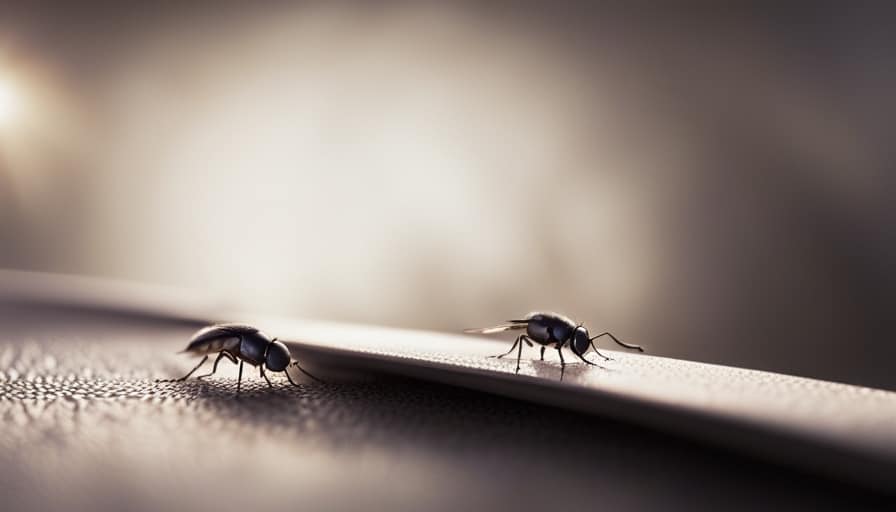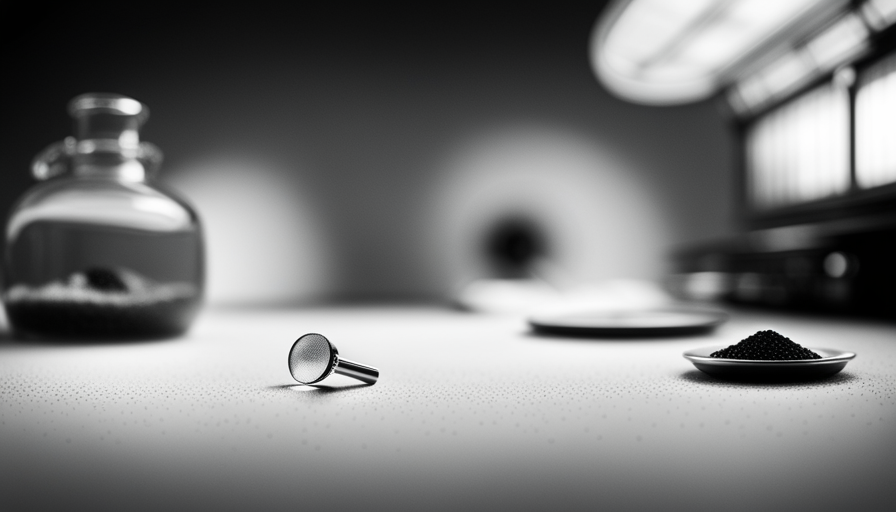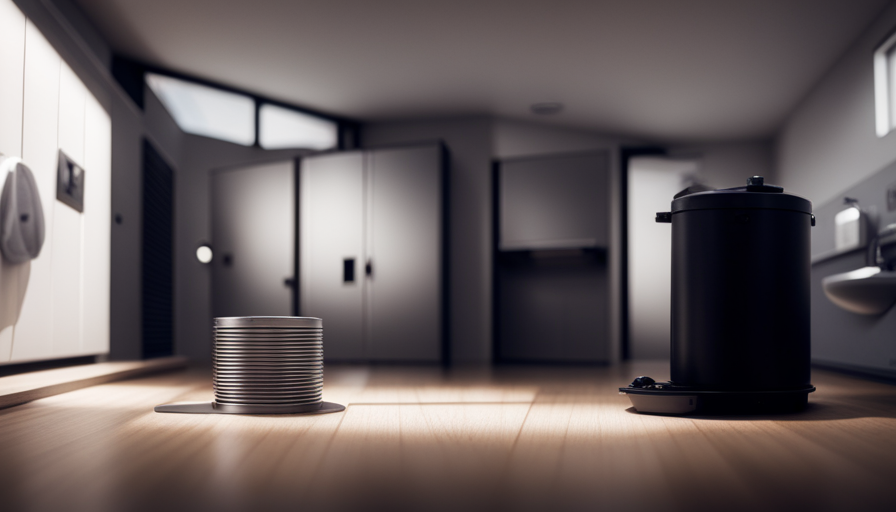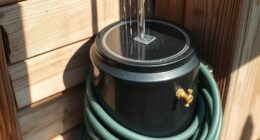- Health risks associated with tiny black flies in the house
- Effective methods to prevent and control the presence of black flies in homes or gardens
I have tried every possible solution, but those annoying tiny black flies refuse to leave my house!
If you’re dealing with the same frustrating problem, don’t worry – I’ve got you covered.
In this article, I’ll share my expert knowledge on identifying these pesky bugs, understanding the causes of their infestations, and provide you with both natural and chemical remedies to banish them for good.
Say goodbye to those annoying flies and hello to a fly-free home!

Key Takeaways
- Identify and eliminate breeding grounds by removing standing water and damp areas.
- Use natural remedies like homemade fly traps with apple cider vinegar and essential oils to repel flies.
- Consider using chemical treatments designed to kill black flies, following the instructions carefully.
- Take preventive measures to keep your house clean and free from food or organic debris to prevent future infestations.
Identifying the Tiny Black Flies
I can use a magnifying glass to examine the tiny black flies and determine their species. When it comes to differentiating between fruit flies and black flies, there are a few key characteristics to look out for.
Fruit flies are usually smaller in size, about 1/8 of an inch long, and have a tan or yellowish body with red eyes. On the other hand, black flies are slightly larger, measuring around 1/4 of an inch, and have a dark black or grayish body with dark wings.
Now, let’s move on to controlling and eliminating black flies in outdoor spaces. One effective method is to eliminate their breeding grounds by removing any standing water or damp areas where they can lay their eggs. Regularly emptying and cleaning birdbaths, flower pots, and gutters can help prevent black fly infestations.
Additionally, using insect repellents or installing fine mesh screens on doors and windows can provide some protection against these pesky pests.

Understanding the Causes of Black Fly Infestations
To understand the causes of black fly infestations, we need to examine their preferred breeding sites and environmental conditions. These tiny pests thrive in moist and decaying organic matter, making the following places common breeding grounds for black flies:
-
Standing water: Black flies lay their eggs in standing water, such as ponds, lakes, and even puddles. It’s crucial to eliminate any stagnant water sources around your house to prevent infestations.
-
Overgrown vegetation: Black flies are attracted to dense vegetation, especially if it’s near water bodies. Trim shrubs, mow your lawn regularly, and remove any overgrown plants to discourage black flies from breeding.
-
Moist organic matter: Black flies lay their eggs in decomposing leaves, grass clippings, and other organic debris. Keep your yard clean and free of debris to reduce the likelihood of black fly infestations.

Understanding these common breeding grounds can help you identify and eliminate the causes of black fly infestations, keeping your home fly-free and comfortable.
Natural Remedies to Eliminate Tiny Black Flies
With a combination of proper sanitation and natural remedies, you can effectively eliminate tiny black flies from your house. One effective natural remedy is making homemade fly traps. These traps can be made using common household items such as apple cider vinegar, dish soap, and a plastic bottle. Simply cut the bottle in half, pour a mixture of apple cider vinegar and dish soap into the bottom half, and place the top half of the bottle inverted into the bottom half. The flies will be attracted to the scent of the vinegar, but the dish soap will prevent them from escaping. Another natural remedy is using essential oils for fly control. Oils such as lavender, peppermint, and eucalyptus have strong scents that repel flies. Simply mix a few drops of your chosen oil with water and spray it around areas where flies are present. By incorporating these natural remedies into your fly control routine, you can effectively get rid of tiny black flies in your house.
| Homemade Fly Traps | Essential Oils for Fly Control |
|---|---|
| – Apple cider vinegar and dish soap mixture in a plastic bottle | – Lavender, peppermint, and eucalyptus oils |
| – Flies are attracted to the vinegar scent but trapped by the soap | – Mix a few drops with water and spray in affected areas |
| – Simple and cost-effective solution | – Oils have strong scents that repel flies |
| – Dispose of trapped flies regularly | – Repeat application as needed |
Chemical Treatments for Getting Rid of Black Flies
By using chemical treatments, you can effectively eliminate black flies from your house. Here are three options to consider:
-
Chemical insecticides: These products are specifically designed to kill insects, including black flies. Look for insecticides that are labeled for use against flies and follow the instructions carefully. Apply the insecticide in areas where black flies are commonly found, such as around windows, doors, and other entry points.

-
Fly traps: There are chemical-based fly traps available that attract and capture black flies. These traps use a combination of chemicals and pheromones to lure the flies in and prevent them from escaping. Place the traps in areas where black flies are present, such as near garbage cans or in the kitchen.
-
Professional exterminator: If you’re dealing with a severe infestation or if chemical treatments haven’t been effective, it may be best to call a professional exterminator. They have access to stronger chemicals and can provide a targeted approach to eliminate black flies from your house.
Remember to always read and follow the instructions on chemical insecticides and traps, and consider the help of a professional if needed.
Preventing Future Infestations of Tiny Black Flies
My best advice for preventing future infestations of tiny black flies in my house is to maintain proper sanitation and eliminate potential breeding grounds.

To maintain a fly-free environment, it’s important to keep your house clean and free from any food or organic debris. Make sure to regularly clean your kitchen, especially the countertops, sinks, and garbage disposal areas. Keep all food stored in airtight containers and promptly clean up any spills or crumbs.
Additionally, it’s crucial to identify and eliminate common breeding grounds for black flies in homes. These include standing water, damp areas, and overwatered plants. Regularly check for any leaks or moisture issues and fix them promptly.
Frequently Asked Questions
Can These Tiny Black Flies Harm Humans or Pets?
I’m not an expert, but I can share that tiny black flies in the house might be annoying, but they usually don’t harm humans or pets. It’s always a good idea to take preventive measures to control their presence.
Are There Any Specific Regions or Climates Where These Black Flies Are More Common?
In certain regions and climates, these pesky black flies tend to be more common. Understanding their preferences can help in devising effective strategies to keep them at bay.

Can These Tiny Black Flies Cause Damage to Plants or Food?
Yes, these tiny black flies can cause damage to indoor plants as they lay their eggs in the soil. They can also contaminate stored food by landing on it and leaving behind bacteria.
How Long Does It Usually Take for Natural Remedies to Effectively Eliminate Black Flies?
On average, natural remedies can effectively eliminate black flies within a few days. However, the exact time may vary depending on the severity of the infestation and the specific remedies used.
Are There Any DIY Traps or Baits That Can Be Used to Catch and Eliminate These Tiny Black Flies?
There are several DIY fly traps and effective baits that can be used to catch and eliminate those pesky tiny black flies. Let me share some knowledge and details on how you can tackle this issue.
Conclusion
So there you have it, a plethora of methods to bid farewell to those pesky tiny black flies that have invaded your humble abode.

From natural remedies to chemical treatments, we’ve covered it all.
Now, armed with this knowledge, you can take control of your home and ensure these unwelcome guests never return.
Happy fly-free living!
I’m Theodore, and I love tiny houses. In fact, I’m the author of Tiny House 43, a book about tiny houses that are also tree houses. I think they’re magical places where imaginations can run wild and adventures are just waiting to happen.
While tree houses are often associated with childhood, they can be the perfect adult retreat. They offer a cozy space to relax and unwind, surrounded by nature. And since they’re typically built on stilts or raised platforms, they offer stunning views that traditional homes simply can’t match.
If you’re looking for a unique and romantic getaway, a tree house tiny house might just be the perfect option.










